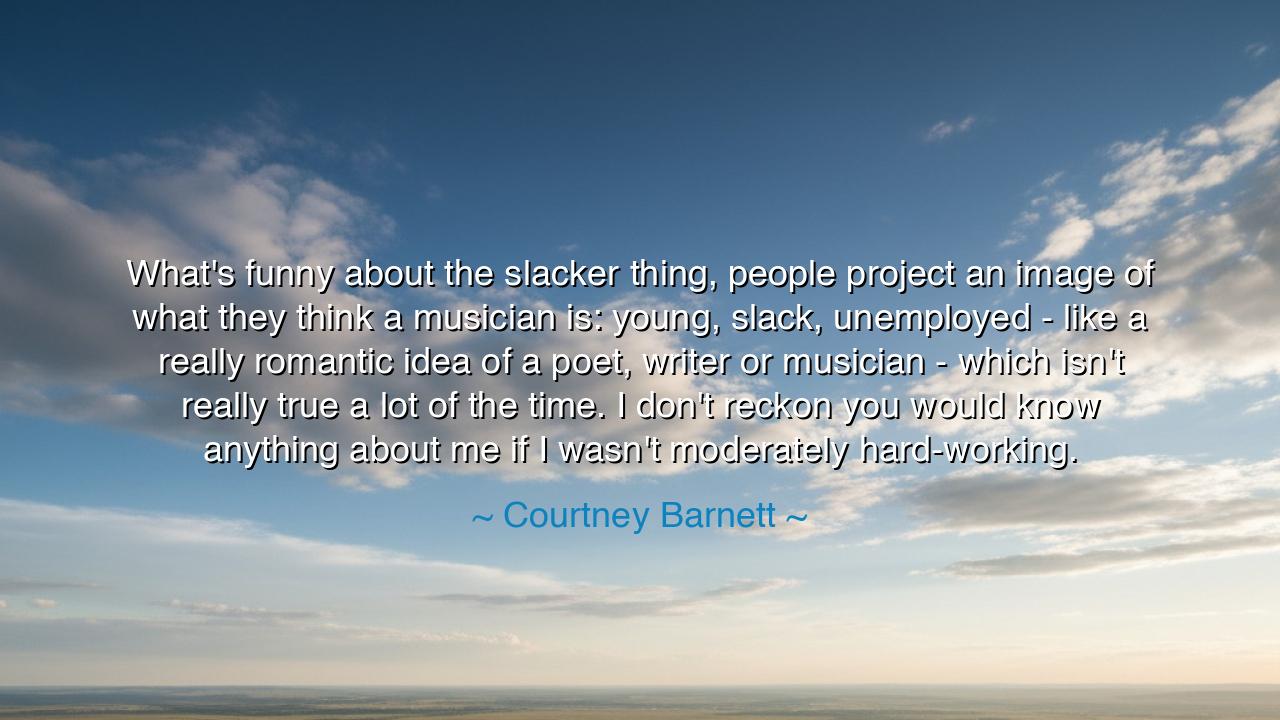
What's funny about the slacker thing, people project an image of
What's funny about the slacker thing, people project an image of what they think a musician is: young, slack, unemployed - like a really romantic idea of a poet, writer or musician - which isn't really true a lot of the time. I don't reckon you would know anything about me if I wasn't moderately hard-working.






"What's funny about the slacker thing, people project an image of what they think a musician is: young, slack, unemployed - like a really romantic idea of a poet, writer or musician - which isn't really true a lot of the time. I don't reckon you would know anything about me if I wasn't moderately hard-working." These words from Courtney Barnett speak to a truth that often gets obscured in the romantic idealization of creative work. The notion of the “slacker”—the lazy, carefree artist who produces brilliance effortlessly—is one that many hold, but it is a myth. Barnett exposes the fallacy in this romanticized view of creativity and artistry. True artistry, she suggests, is often the result of dedication and hard work, not the whim of a carefree, idle existence. This is a reminder that the process of creating—whether it be through music, writing, or poetry—is rarely as simple or effortless as many would like to believe.
Throughout history, great artists and creators have been portrayed as tortured souls, living in bohemian squalor, untouched by the mundane concerns of the world. Poets like Lord Byron and writers like F. Scott Fitzgerald were often romanticized as figures who lived on the edge of society, creating profound works in between bouts of personal turmoil. These idealized portrayals have permeated our understanding of creative life, leading many to believe that to create art, one must live outside the norms of everyday life, free from the constraints of discipline or routine. But as Barnett points out, this image is often far from the truth. Creativity—true, lasting creativity—is not born from idleness, but from the tireless pursuit of one’s craft, from a constant striving to improve, to innovate, and to grow.
In the ancient world, great thinkers and artists, though celebrated for their contributions, were also recognized for their relentless dedication. Socrates, the great philosopher, may have lived in a simple manner, but his wisdom was the product of years of study, debate, and constant questioning. His mind was not idle—it was constantly engaged in the search for truth. Similarly, Homer, the legendary poet, likely spent years honing his craft, his epic tales of heroism and fate coming from a deep understanding of human nature, not simply divine inspiration. The idea that art is born from effort and commitment is not new—it is a principle as old as the pursuit of knowledge itself.
Barnett’s reflection on the slacker myth also calls attention to how society views creativity. There is a tendency to romanticize artists as living outside the conventional structure of the world, as if their value lies in their disconnection from everyday life. This notion places the artist on a pedestal, but it also sets up an unrealistic expectation that creativity comes naturally, without discipline or struggle. The truth, however, is far more grounded. As Barnett herself states, it is her moderate hard work—her commitment to continually improving and refining her craft—that has allowed her to reach her current success. This message is not just for aspiring musicians or writers, but for all who seek to create: the path to success in any field is not paved with idleness, but with dedication, effort, and an unwavering commitment to growth.
To illustrate this point, consider the story of Michelangelo, who, though hailed as one of the greatest artists of all time, was known for his relentless work ethic. The creation of the Sistine Chapel, that masterpiece of art, did not come from a place of ease. Michelangelo labored for years on his back, painting the ceiling of the chapel, often working tirelessly, refusing to take breaks. His commitment to his art, his willingness to sacrifice comfort for the sake of perfection, is what allowed him to produce a work that has moved generations. Art, for Michelangelo, was not a passive, inspired act—it was a demanding and diligent pursuit of mastery.
Barnett’s words call us to question our own assumptions about creativity. It is easy to romanticize the idea of effortless art, to imagine that the greatest works are created in a flurry of inspiration, with little regard for the labor required. But true artistry requires sacrifice, focus, and resilience. The lesson here is clear: if we wish to create something meaningful, whether in art, business, or life itself, we must be willing to put in the work. The process may not always be glamorous, and it may not always be easy, but the fruits of hard work are always worth the effort. Creativity demands our attention, our time, and our dedication—it is not simply a gift that falls upon us, but a muscle that must be exercised and cultivated.
In our own lives, let us remember that creativity and success are not born of idle dreams or romantic fantasies. They are the result of our commitment to our craft, to our goals, and to the hard work that we put into achieving them. Whether we are musicians, writers, painters, or simply individuals striving to build something meaningful, the road to excellence is paved with effort. Let us embrace this truth, knowing that through consistent dedication, we can all create something profound and lasting—something that is a true reflection of our work and our passion.






AAdministratorAdministrator
Welcome, honored guests. Please leave a comment, we will respond soon